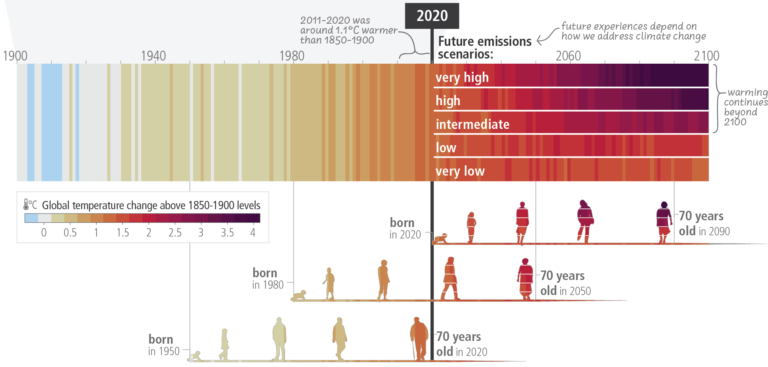A climate change visualization created at the University of Reading has been used in the Intergovernmental Panel on Climate Change’s (IPCC) Sixth Assessment Report.
Professor Ed Hawkins, climate scientist at the University of Reading and National Centre for Atmospheric Science (NCAS), initially created the warming stripes in 2017 to show the rise in global average temperature for each year since 1850, with blue for cooler temperatures and red for hotter years. The graphic illustrates the different worlds future generations will face depending on how early climate action is taken. If drastic action is not taken sooner and warming continues beyond 2100, future generations will face extreme weather conditions due to rising temperatures.
Hawkins said, “The use of the warming stripes in the IPCC’s Assessment Report is a haunting reminder of the consequences we are facing if we fail to act on climate change now. These stripes portray a stark picture of the different and dangerous worlds that future generations could inherit, depending on our actions today.
“The deepening red stripes are an urgent warning of the adverse effects of rising temperatures. If we don’t take rapid action by lowering emissions, future generations will be left to bear the brunt of extreme weather, such as more intense heatwaves, droughts, floods and storms. This is not just about rising numbers on a chart, this is about the genuine impact on people’s lives, businesses and communities. Every bit of warming avoided makes the consequences less severe,” he said.
The IPCC’s Sixth Assessment Report calls for ‘urgent climate action’ to ‘secure a liveable future for all’. The report, produced by climate scientists from around the world, is the culmination of key findings on the causes, impacts and solutions to climate change that have been released over the past five years.
Commenting on the report, Bill Collins, Professor of Climate Processes at the University of Reading, said, “This latest report sets out the exciting possibility of a sustainable future. While some have worried about the cost of this, a key finding from this report is that there will be substantial benefits to air quality (such as ground-level ozone) from moving away from fossil fuel economies. The economic returns from these immediate health benefits are assessed to be greater than the costs incurred even before accounting for all the future climate benefits.
“But we are not currently on this path. Future CO2 emissions just from the fossil fuel infrastructures currently in place will take us beyond 1.5°C. Time is running out. How much fossil fuel we burn this decade will determine whether warming can be limited to 1.5°C or 2°C. The time is now to decide whether or not to take the sustainable path set out by the IPCC.”
Professor Andy Turner, a climate scientist with expertise in monsoon systems at University of Reading, and a lead author of IPCC AR6 WGI (Chapter 10 – Linking Global to Regional Climate Change), said, “The IPCC Sixth Assessment Report has demonstrated clearly that every additional fraction of warming will lead to intensification of the global water cycle and larger extremes. For the monsoon regions around the globe, most worrying is the increase in variability, associated with a greater likelihood of flood and drought, which are damaging to agricultural yields, water supply and human health.
“As the Synthesis Report makes clear, the scale of the challenge is unprecedented, with the burden falling disproportionately on the developing world such as those in the monsoon regions and elsewhere in the tropics.
“The IPCC Sixth Assessment offers a clear way forward in ‘climate-resilient development’, which seeks win-win solutions to reduce or avoid greenhouse gas emissions at the same time as improving quality of life.
“Just as the damaging impacts of climate change will worsen with each degree of warming, the costs of taking action will also rise, should we delay making the necessary deep and sustained cuts in greenhouse gas emissions,” said Turner.



